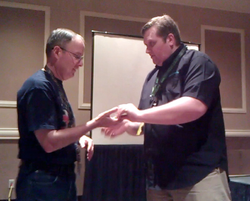Christopher J. Hadnagy | |
|---|---|
 General Keith Alexander (left) offers Chris Hadnagy the NSA Director's challenge coin at DEF CON 20 [1] | |
| Born | Christopher James Hadnagy |
| Occupations | Information technology consultant, author |
| Organization(s) | Innocent Lives Foundation, Social-Engineer, LLC |
| Website | www |
Christopher James Hadnagy is an American author and information security consultant. He specializes in social engineering and founded a company that provides related services and training. He has also taught classes and written books on the topic. He established the Innocent Lives Foundation, which aims to protect children by identifying online predators and providing information about them to law enforcement agencies. He coordinated educational events at DEF CON about social engineering for several years. In 2022, the DEF CON organizers banned him from the conference based on reports of code of conduct violations. [2] [3] He denied wrongdoing and in 2022 sued the organizers for defamation, [3] [4] but the suit was dismissed with prejudice in 2025. [4] [5]